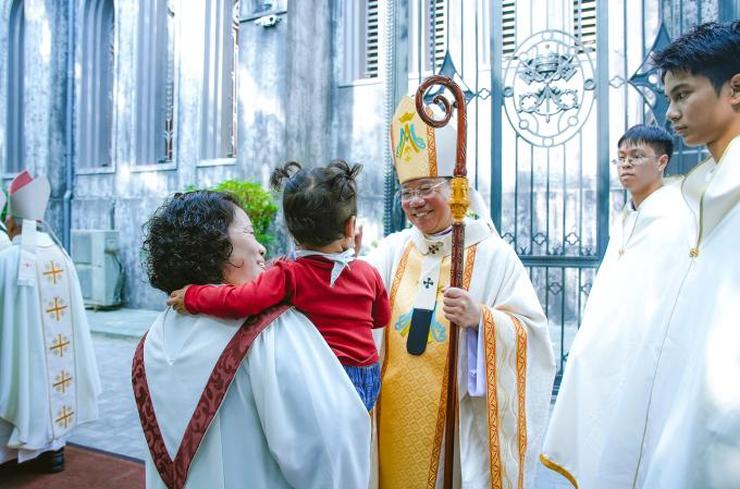In a historic step, the Hanoi government has invited Pope Francis to visit the country. We talk with Mons. Nguyen Anh Tuan, bishop of Ha Tinh “New climate, trusting us more.”
The Catholic community in Vietnam makes up one of the most vibrant Churches in Asia today, with 7 million faithful in a country of over 100 million inhabitants. Almost fifty years after the communist regime conquered Saigon in 1975, opening a new season of persecution for the local Catholic Church, the authorities in Hanoi have officially invited Pope Francis to visit the country with a letter sent by President Vo Van Thuong, who visited the Vatican last July.
On Christmas Eve, Pope Francis officially appointed a permanent representative of the Holy See in Vietnam, Monsignor Marek Zalewski, who is also the apostolic nuncio to Singapore and will now reside in Hanoi. A diplomatic step resulting from patient bilateral negotiations that have continued for years.
Last September, precisely to underline the importance of the new climate that had been created, the Pontiff himself wrote a letter to Vietnamese Catholics in which he invited the Catholic faithful to live as “good Christians and good citizens”, testifying to the love of God “without distinction of religion, race or culture”. “We must always move forward…recognising convergences and respecting differences”, the Pope also wrote. This also entails a responsibility for Vietnamese Catholics who, Francis observed, realize “their own identity as good Christians and good citizens” both by animating their Church and by spreading the Gospel in daily life. A testimony which, thanks to the development of “favourable conditions for the exercise of religious freedom”, can help the Catholic faithful to “promote dialogue and generate hope for the country”.
Monsignor Louis Nguyen Anh Tuan, 63, bishop of Ha Tinh, in the north of the country, comments, “The people were very happy to receive Pope Francis’ letter. It was the first time he addressed the faithful directly and they are now they are waiting for the opportunity to welcome him to Vietnam. We have wanted to invite him for several years. Today the government also wants this visit.”
Speaking about relations between the Holy See and Vietnam, Monsignor Anh Tuan says: “The joint working group between the Vatican and government representatives worked with great patience. The president’s visit to the Vatican last July with the signing of the agreement on the presence of the permanent representative of the Holy See in Hanoi was an important step. We expect it will be of help in our work to expand our pastoral activities, we have seen a change in recent years where we have been given much more freedom.”
During the Coronavirus pandemic, the church was very present and this was recognized by the government. The bishop said “Saigon was greatly affected and the dedication with which many priests, nuns and lay people assisted the victims was recognized by the government. Trust in us has grown and I think it was an opportunity to testify to faith through welfare activities.”
Development in a country like Vietnam however remains an open challenge: “The gap between the big cities and the rural areas is very large”, explains the bishop of Ha Tinh. “In my diocese I see young people leaving for Saigon, Hanoi, Da Nang, Hai Phong, but also for Korea, Japan, Malaysia or the United States and Europe, where they can earn a living. We educate children in perceiving the faith as something like a spiritual baggage to carry with them wherever they may find themselves in the future. However, our Church is still looking for solutions to their pastoral care, we must work more with the Churches of the destination countries; this is also part of the work of the synodal Church.
The Vietnamese Catholics are a dynamic community, wherever they gather, this is confirmed by many. One of the ways we are trying to address the problem is by sending missionaries with them who are not only for the Vietnamese but also at the service of the local Churches where they are introduced. An ad vitam ministry, also made possible by the fact that vocations to the priesthood and consecrated life are still deeply rooted in Vietnam.”
This resource is proof of the vitality of the Vietnamese Church. “Last year”, says the prelate, “in my diocese, we had 105 candidates for the seminary, but we could only take 30. Some bishops send those they cannot accommodate to other countries such as New Zealand or Australia. Vocations are still plentiful, more so in rural areas than in cities. A social reading of this phenomenon can be given: these are the poorest areas and the Catholic families there are much more devout. But I look at the spiritual meaning: it is the place where the Lord calls us to serve the Kingdom of God. After all, as Jesus said in the Gospel “Blessed are you poor because the Kingdom of God is yours.”
The Catholic Church in Vietnam has almost 7 million baptized people, that is, 9% of the population distributed in 3 archdioceses and 24 dioceses with 41 bishops. There are 11 major seminaries and approximately 7,700 Catholic institutions in the country and 3,047 parishes are spread across the territory with 8,000 priests. Catholicism is the country’s second religion, after Buddhism. (Giorgio Bernardelli/MM)






